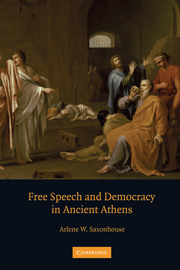Book contents
- Frontmatter
- Contents
- Acknowledgments
- Prologue: Four Stories
- PART I INTRODUCTION
- PART II AIDÔS
- 3 The Tale of Two Gyges: Shame, Community, and the Public/Private Self
- PART III PARRHÊSIA: THE PRACTICE OF FREE SPEECH IN ANCIENT ATHENS
- PART IV THE LIMITS OF FREE SPEECH
- Conclusion: Four Paradoxes
- References
- Index
3 - The Tale of Two Gyges: Shame, Community, and the Public/Private Self
Published online by Cambridge University Press: 06 January 2010
- Frontmatter
- Contents
- Acknowledgments
- Prologue: Four Stories
- PART I INTRODUCTION
- PART II AIDÔS
- 3 The Tale of Two Gyges: Shame, Community, and the Public/Private Self
- PART III PARRHÊSIA: THE PRACTICE OF FREE SPEECH IN ANCIENT ATHENS
- PART IV THE LIMITS OF FREE SPEECH
- Conclusion: Four Paradoxes
- References
- Index
Summary
Gyges the Lydian warrants two stories in the ancient corpus. In one he is a shepherd; in the other he is the bodyguard to a king. In both he kills the king and marries the queen. Plato has Glaucon in the Republic introduce the myth of the shepherd Gyges (or, to be more precise, an ancestor of Gyges), giving the shepherd a magical ring that grants him invisibility. Glaucon thus challenges Socrates to explore the question of why the shepherd in possession of this magical ring should not kill the king and marry the queen, that is, take what is not his and be unjust. In Herodotus' tale the queen commands the king's bodyguard Gyges to kill the king and marry her or be killed himself. It is Herodotus' tale that will help me introduce the concept of shame in this chapter and it is Plato's Gyges who will conclude the chapter.
HERODOTUS' GYGES
Candaules, the king of the Lydians, enthralled by and clearly proud of the beauty of his own wife, does not believe that his bodyguard Gyges fully appreciates the extent of that beauty, though the king has spoken to him of it often and with great enthusiasm. To convince Gyges, Candaules insists that Gyges see his wife naked. Gyges resists: “Master, why do you speak such unhealthy words, commanding me to see my mistress naked? When her clothes are set aside, a woman sheds also her shame (tên aidô).
- Type
- Chapter
- Information
- Free Speech and Democracy in Ancient Athens , pp. 57 - 82Publisher: Cambridge University PressPrint publication year: 2005



